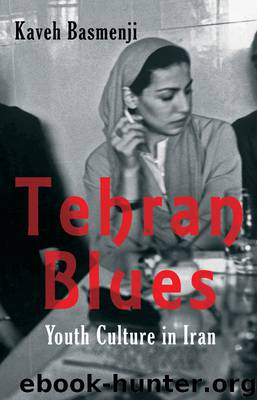Tehran Blues by Basmenji Kaveh

Author:Basmenji, Kaveh.
Language: eng
Format: epub
ISBN: 9780863565151
Publisher: Lightning Source Inc.
EIGHT
Looking to China
If there is anyone who believes that there will be another wave [of unrest] in Iran, I totally disagree. In Iran, an event will not take place easily. Because the clergy and the religious forces are the most rooted classes of this society … There are a hundred thousand mosques and Hosseiyyehs, surrounded by a lot of good people, and the clergy has the leadership. Now that we are in power, the mosques must be accountable to the opposition. If someday a government takes over that is against these [religious classes], putting them in opposition, they will give such a government hell.
Akbar Hashemi Rafsanjani, 2004
Every revolution evaporates and leaves behind only the slime of a new bureaucracy.
Franz Kafka
Although Rafsanjani himself liked to be called ‘the commander of construction’ and ‘Amir Kabir of modern times’, many people half-jokingly called him ‘Akbar Shah’; and a journalist called him ‘Ayatollah Deng Xiao Ping’. And not totally without reason. During his tenure, flamboyance and extravaganza were reintroduced. After years of watching the imam sitting on a dilapidated chair, people now saw Rafsanjani in a huge golden-framed leather upholstered armchair, talking of a ‘display of luxury’.
The first two years after Ayatollah Khomeini’s death, in mid-1989, roughly coinciding with the presidency of Akbar Hashemi Rafsanjani were marked by the gradual liberalisation of social and economic controls. Hopes grew of a more tolerant society, reflecting Iran’s multi-ethnic populace and traditions of diversity.
Ayatollah Khomeini’s demise in 1989 more than anything else marked an end to the epoch of charismatic revolutionary leadership in Iran. In the absence of his authority, a new labour division, so to speak, was imperative if the system was to survive and consolidate itself. The unlikely successor to the imam was President Ali Khamenei, elected by the Assembly of Experts. While observers generally expected the Assembly to come up with a Leadership Council, the consensus among the ruling clergy was that the system based on Velayat-e Faqih indeed needed a single Vali-e Faqih. The lack of charisma, however, was later to be compensated for by extra powers given to the faqih when the constitution underwent changes a short while later.
Ali Khamenei was born in Mashhad in 1939. He began religious studies before completing the elementary education. He attended the classes of masters of ‘Sat’h’ (seminary lectures based on reading textbooks) and ‘Kharej’ (seminary lectures not based on reading textbooks) in Mashhad, such as Hajj Sheikh Hashem Qazvini, and Ayatollah Milani, and then went to Najaf in 1957.
After a short stay he left Najaf for Mashhad, and later he settled in Qom in 1958. Khamenei attended the classes of Ayatollahs Boroujerdi and Khomeini. Later he was involved in the Islamic activities of 1963 that led to his arrest in the city of Birjand in southern Khorasan province. After a short period he was released and continued his life by teaching in religious schools of Mashhad and teaching Islamic texts in different Mosques.
In December 1974 Khamenei was arrested at his home by SAVAK and dispatched to the joint committee prison of the police department in Tehran.
Download
This site does not store any files on its server. We only index and link to content provided by other sites. Please contact the content providers to delete copyright contents if any and email us, we'll remove relevant links or contents immediately.
| Africa | Americas |
| Arctic & Antarctica | Asia |
| Australia & Oceania | Europe |
| Middle East | Russia |
| United States | World |
| Ancient Civilizations | Military |
| Historical Study & Educational Resources |
Empire of the Sikhs by Patwant Singh(23085)
The Wind in My Hair by Masih Alinejad(5095)
Rise and Kill First by Ronen Bergman(4789)
The Templars by Dan Jones(4689)
The Rape of Nanking by Iris Chang(4213)
12 Strong by Doug Stanton(3550)
Blood and Sand by Alex Von Tunzelmann(3203)
Babylon's Ark by Lawrence Anthony(2679)
The History of Jihad: From Muhammad to ISIS by Spencer Robert(2628)
No Room for Small Dreams by Shimon Peres(2368)
The Turkish Psychedelic Explosion by Daniel Spicer(2357)
Inside the Middle East by Avi Melamed(2356)
Gideon's Spies: The Secret History of the Mossad by Gordon Thomas(2351)
Arabs by Eugene Rogan(2299)
The First Muslim The Story of Muhammad by Lesley Hazleton(2271)
Come, Tell Me How You Live by Mallowan Agatha Christie(2260)
Bus on Jaffa Road by Mike Kelly(2159)
1453 by Roger Crowley(2031)
Kabul 1841-42: Battle Story by Edmund Yorke(2029)
